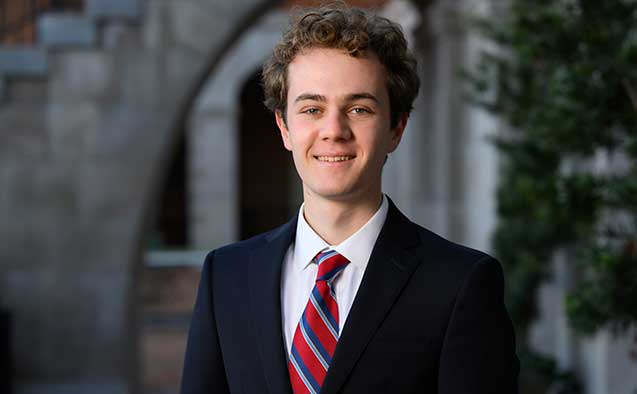Economics: Tal Feldman
Though Stamps Scholar Tal Feldman didn’t come to Wake Forest intending to be an economics major, he left as one. He’s also leaving as a Truman and Schwartzmann Scholar, two prestigious awards that will fund two separate graduate programs for him to further his economic studies.
“The way my first economics class tackled these questions of inequality, poverty and development were all really interesting to me,” Feldman said, describing how he came to study economics. “I liked the framework of thinking through big social questions analytically, mathematically, empirically.”
Dr. John Dalton, Feldman’s sophomore year macroeconomics professor, was especially influential in deepening his interest in the subject. Feldman described speaking with him for hours across a broad range of subjects and Dalton challenging him to move beyond his initial political beliefs and dogma.
“Dalton [encouraged me] to try to come up with possible objective answers to questions about the best macroeconomic interventions rather than just thinking about things based on feelings,” Feldman said.
He added that other pillars of support during his time at Wake Forest included economics professor Dr. Aeimit Lakdawala, who read and discussed additional articles with him outside of class, and Director of the Wake Forest Scholars program Jackie Sheridan.
“Jackie Sheridan will top my list [of who has been most impactful]. She has been the best. She’s helped me with everything, from personal to academic to extracurricular [matters],” Feldman said.
Another impactful experience came from studying abroad his junior year at the London School of Economics. There, in addition to studying politics, math and statistics, Feldman took his most influential economics class — public economics — whose subject matter tackles how the government can economically intervene to alleviate social issues. Before taking the class, Feldman noted that he only vaguely understood that the government could solve inequalities such as poverty and healthcare disparities. The course solidified this notion and provided him with empirical evidence to back up potential economic solutions, knowledge he says he will take into his future career.
More recently, Feldman made the unusual decision to end his time at Wake Forest by studying abroad in Santiago, Chile, citing his desire to expand his knowledge of economic development. Already having studied economics in the United States and England, he wanted to unravel South American development policies and programs and to see local perspectives on how to approach economic issues.
His greatest takeaways from his major have been how to be a more rational decision maker and, more importantly, that people are not the rational decision makers that economic models would like them to be.
“Things are so much more complicated when you are actually looking at the way people behave. It can’t just be boiled down to simple rational kinds of decision makers that we like in economics, and that’s what really opens up the rest of the discipline,” Feldman said. “The interesting stuff is figuring out why and how we can make things better.”
After graduation, Feldman will continue his studies as a Schwartzman Scholar, a prestigious full-ride scholarship that will enable him to earn a one-year master’s degree in global affairs at Tsinghua University in Beijing, China. In addition to foreign affairs, he will take courses about economic development centered both within the Chinese model and globally. He predicts that deepening his knowledge of China and learning Mandarin will prove instrumental in his future public service portfolio.
Upon completion of his degree at Tsinghua University, as a Truman Scholar, Feldman will have funding to complete another public service-related master’s program.
Following that, in the long-term, Feldman dreams of working for the federal government in economic and technology policy.
“I want to know how I can translate all of these academic skills that I’ve acquired in economics and math and statistics into actually implementable policy goals. How can I translate it into a world in which things are more complicated than in our basic economic models?” Feldman said. “I’ve always wanted to work for the government after my education. That’s always been the goal.”
